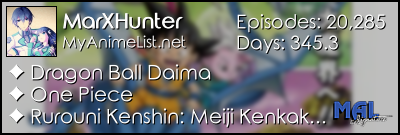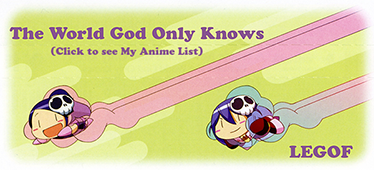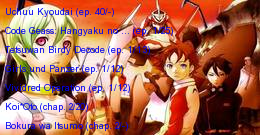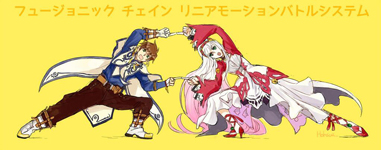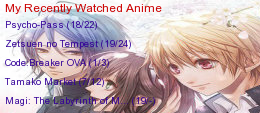This was a pretty good and somewhat interesting episode; likely the best since the fourth, but, unfortunately, it still felt rather unsatisfying, due largely to the implications for the next episode and the potentially fleeting nature of the meaningful developments in this one, while also lacking a compelling focus, as it essentially established and explored the full fruition of both triangles, which, despite the wonderfully energetic atmosphere, didn’t thoroughly complement a heightened level of enjoyment, which has been a disappointingly familiar predictability that the show has slipped into ever since Chizuru’s introduction. Thankfully, despite these occasionally noticeable flaws, the lighthearted nature of the episode was quite effective, only ever slipping into a dramatic interlude momentarily.
Though this is essentially the third time it's occurred, my favorite sequence was Shizuku's terrific confession, which was a rather satisfying and immensely refreshing moment. The ending should have been entirely fantastic, and, for the most part, it was, as Shizuku is finally compelled to elaborate on her love for Haru and, for a very brief moment, it seems that their perpetually stalled relationship would develop in a significant manner, but even this supposedly satisfying interaction was ultimately sabotaged by a tiring monotony, in which Shizuku, rather understandably, decides to continue with her classes, which, of course, Haru misunderstands, thus diminishing the nearly meaningful nature of said development. This perception is strengthened by the very last scene, in which it appears that their relationship has, once again, reverted back to the tiresome status quo.
Haru is easily the best character, as he possesses an immensely layered characterization, but his eccentric personality was somewhat inconsistent and exaggerated at particular moments; not detrimentally so, but it portrayed a lack of properly noticeable character development. Of course, Shizuku's partially at fault, since her naturally apathetic exterior has, to Haru, created a perception of seeming indifference to their relationship, which certainly isn't an accurate assessment, but perfectly understandable in relation to Haru's social awkwardness, and, in combination with his necessary distrust of Yamaken, it creates an intermittent sort of possessive inclination. Despite this, his relationship with Shizuku is great, as their interactions are exceptionally good, suffused with a natural, often comedic, but occasionally romantic, chemistry, so it's disappointing that, since the fifth episode, there's been no substantial development within their relationship, which, of course, I'm hoping will be satisfyingly remedied by the conclusion.
Yamaken remains a considerably unlikable character, rarely displaying moments of genuine intrigue, hardly providing any element of worth to the narrative. As such, his heightened involvement has become highly tedious and repetitive, as his contrived appearances only serve to artificially interfere with a relationship that has been devoid of significant development for far too long already. This, yet again, is illustrated by Yamaken conveniently attending the same course as Shizuku throughout the winter break, which will inevitably only serve to reaffirm Yamaken's feelings for Shizuku. Hopefully, it will also motivate Haru into action, but I'm not exactly confident in this slim possibility. His dull personality really doesn’t complement the interactions he continues to have with Shizuku, since it’s far too detrimentally similar to Shizuku’s own characterization. As such, the entirety of his rather thin characterization seems to solely consist of the tendency to arrogantly interfere with Haru and Shizuku‘s relationship, while constantly feigning innocence and internally denying the feelings he clearly has towards her, which, though necessary for a triangle to be formed, is an aspect of character development that I couldn't care less about, especially since it’s arrived as the story nears it’s potentially unsatisfying and needlessly chaotic conclusion.
Natsume continues to be one of the best and certainly the most perceptive character, particularly displayed by her excellent confrontation with Yamaken in the hallway, in which she comprehensively noticed and subsequently mentioned the ridiculous and unwanted nature of Yamaken's continued idiocy. Her interactions with others are always great, especially those she has with Haru, and, in this particular episode, her momentary interactions with Chizuru were hilarious. Even though it's consistently amusing, it's somewhat disappointing that she's still seemingly infatuated with Mitsuyoshi, as this will likely be a development that won't receive proper closure. It definitely appears that Sasayan has developed considerable feelings for Natsume, as unmistakably illuminated by his dismissive remark to Mitsuyoshi that suggested he had lost, which is an excellent aspect of his characterization, but, similar to Natsume's feelings for Mitsuyoshi, it seems unlikely that this will be resolved by the end of the show, since, above all, it appears inevitable that Natsume will eventually end in a relationship with Sasayan.
The elements of a triangle that have increasingly filtered into the narrative are disappointingly predictable, as the show has marginally, though not irrevocably, deteriorated into the conventional structure of a shoujo, which, in turn, has induced a plethora of cliché disruptions within Haru and Shizuku’s relationship, ultimately detracting from the energetic nature of the show, and, as a result, the story has lost it's momentum, particularly in regards to the romantic aspect. As such, I'm hoping that this latest development is a lasting one, but that remains a thoroughly uncertain proposition. Unfortunately, the narrative execution has been mediocre throughout the latter half of the show, lingering on monotonous complications and uninteresting characters for an extensive amount of time, isolating these diversions into a state of irritating repetition. It's also retracted previous character development for Haru and Shizuku, temporarily accentuating their respective flaws that had supposedly lessened over the course of the show, in order to cheaply lengthen the tenuous element within their relationship, such as Haru's erratic, but occasionally understandable, behavior in this episode or Shizuku's naive attempts to delay the realization of their relationship by unnecessarily resolving to solely focus on studying earlier in the story, which seem all too sudden and deliberately manufactured.
The visuals are remarkably consistent, due, in large part, to the superb aesthetic, which excellently illuminates the lively atmosphere that pervades through the majority of scenes, displayed most notably throughout the scene in which Haru and Shizuku converse as they walk through their decorative city, which wouldn't have been nearly as effective without the colorful vibrancy that heightened the enjoyable nature of those moments. The animation was quite inconsistent throughout, though impressive during the final sequence, in which Shizuku's subtle movements and various expressions were captured quite well.
All in all, Tonari slightly improved with this episode, essentially illustrating an impressive balance that has been practically absent for so long. Of course, due to the inclusion of several ancillary characters and trite developments, it still fails to reach the brilliance of the first four episodes, which is disappointing, but expected, given the needlessly complicated nature of the narrative. As such, it’s narrative flaws and predictable contrivances remain very noticeable, and, in turn, this creates a somewhat illusory effect that permeates throughout several meaningful developments, such as Shizuku's confession, since they seem potentially short-lived. I’m not really looking forward to the next episode, as, judging by the title, it appears to be an episode that includes an insufferable prevalence of Yamaken’s developing feelings and inconsequential moments of purposeful interference. Of course, with only three episodes left, these criticisms become more pronounced, as it seems an altogether flawed approach to storytelling, since it doesn’t exactly lend itself to a greatly satisfying conclusion. |







